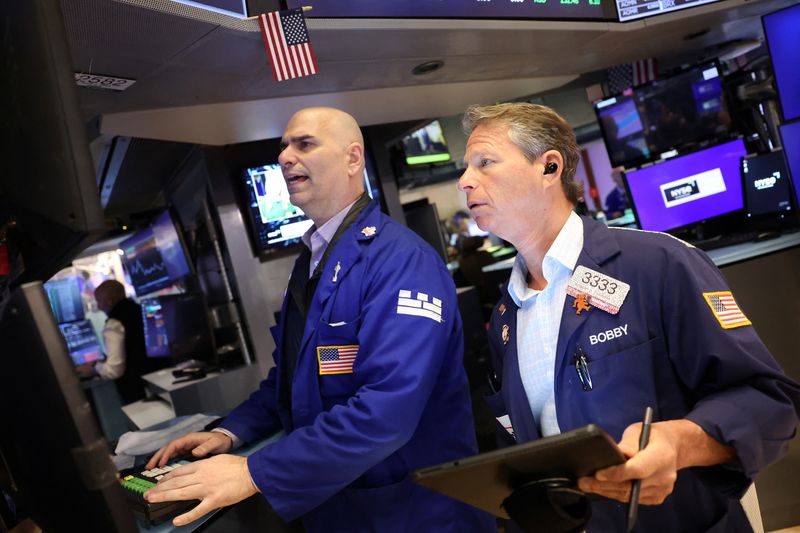Select Language

U.S. stock futures edge down after solid corporate earnings and economic data helped to soothe concerns around high stock valuations. Some members of the U.S. Supreme Court’s conservative supermajority express skepticism about the White House’s use of emergency economic powers to impose aggressive tariffs. Qualcomm warns that it could lose some business from a major customer, while Tesla shareholders are set to hold a vote on a $1 trillion pay package for CEO Elon Musk.
1. Futures inch lower
U.S. stock futures pointed lower on Thursday, following a rebound in the prior session after worries around elevated stock valuations hit equities earlier in the week.
By 02:27 ET (07:27 GMT), the Dow futures contract had slipped by 42 points, or 0.1%, S&P 500 futures had fallen by 7 points, or 0.1%, and Nasdaq 100 futures had declined by 47 points, or 0.2%.
The main averages on Wall Street climbed on Wednesday, with mega-cap technology stocks in particular notching gains. The uptick helped to tamp down emerging fears over the sustainability of heightened stock valuations, especially in the artificial intelligence-driven tech sector.
Bolstering sentiment as well were alternative data sources which suggested that U.S. economic conditions remained solid in October. Officials and policymakers alike have been starved of official figures during an ongoing government shutdown that has dragged on for more than a month.
Media reports suggested that lawmakers in Washington could forge an agreement to end the shutdown by this weekend. Should it linger on, Transportation Secretary Sean Duffy has warned, air travel capacity at 40 major American airports will be reduced by 10% from Friday.
2. Supreme Court shows skepticism on IEEPA tariffs
Meanwhile, markets were highlighting a note of skepticism among members of the U.S. Supreme Court’s conservative supermajority toward President Donald Trump’s use of emergency economic powers to impose sweeping tariffs.
On Wednesday, the high court began hearing oral arguments on Trump’s usage of the 1977 International Emergency Economic Powers Act, or IEEPA, as legal backing for the levies. The matter has been brought before the Supreme Court after lower courts ruled that the president had surpassed his authority by employing the measures.
Some debate has swirled around whether the court’s 6-3 conservative supermajority, which includes three Trump picks, will ultimately choose to strike down or uphold the IEEPA tariffs. For much of Trump’s second term in office, the Supreme Court have broadly supported the White House’s efforts to centralize decision-making powers in the executive branch.
For that reason, sharp questioning of IEEPA’s application to the duties by Chief Justice John Roberts was met with some surprise. The tariffs represented a tax on Americans, Roberts argued, adding "that has always been the core power of Congress."
Bets that the tariffs will survive the fall dropped in prediction markets, although analysts at Vital Knowledge flagged that, if the levies are not upheld, investors could be looking at a more uncertain economic landscape. Trump officials have also hinted that they could take advantage of other legal means to keep the president’s trade war going.
3. Qualcomm flags possible loss of Samsung business
Shares of Qualcomm sank by more than 3% in extended hours trading after the chip designer unveiled that it may lose some business from top customer Samsung Electronics next year.
The announcement overshadowed current-quarter sales and profit forecasts from the chip designer that surpassed Wall Street expectations thanks in large part to demand for premium smartphones. Qualcomm is a major global supplier of the modem chips which help connect these devices with wireless data networks.
Partially fueling these sales has been Samsung, which uses the chips in its Galaxy S25 model phones. However, CEO Cristiano Amon said Qualcomm is now preparing for the chips to make up a lower share of Samsung’s next-generation versions of the handset, Reuters reported.
Elsewhere, fellow chip technology provider Arm Holdings’ fiscal third-quarter outlook surpassed estimates as well, buoyed by heavy recent AI spending throughout the tech industry. Shares of the U.K.-based group rose after-hours.
4. Tesla shareholder vote ahead
Tesla shareholders are expected to decide today on a massive compensation package for CEO Elon Musk, with at least one major stakeholder having already outlined plans to vote against the measure.
Earlier this week, Norway’s sovereign wealth fund -- and the world’s largest -- said it would reject the roughly $1 trillion pay package Tesla has put forward for Musk, citing concerns over the scope and effect of the award.
Norges Bank Investment Management, which manages the $1.9 trillion fund, said that while it "appreciate[s] the significant value created under Mr. Musk’s visionary role" at the helm of the electric carmaker, "we are concerned about the total size of the award, dilution, and lack of mitigation of key person risk."
But Tesla’s board has flagged that should shareholders say no to the compensation, there is a risk that Musk -- the world’s richest man -- will leave the company, potentially pushing down its stock price.
5. BoE decision
While last week’s Federal Reserve interest rate cut, as well as policy holds by the European Central Bank and Bank of Japan, were widely anticipated, the Bank of England’s announcement later today is far from certain.
Markets are projecting that the BoE will keep rates steady, although there was still a roughly one-in-three chance that the central bank will ease borrowing costs by a quarter of a percentage point.
Leaving rates unchanged would be the first slowing in a cycle of policy loosening which began last year, but some analysts now expect a possible drawdown because of recently softer-than-expected -- albeit relatively elevated -- consumer price inflation and wage data.
The BoE has consistently slashed rates every three months since August last year, yet it is now unclear if it will maintain this pace, with Governor Andrew Bailey saying in September that the path ahead is "more uncertain."

